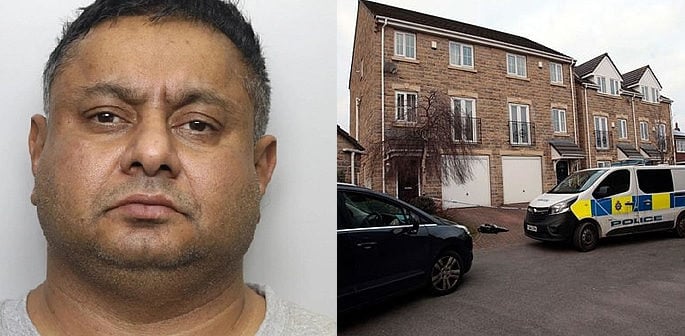"I did it. I threw matches around the house."
Abdul and Saheeda Kapde had an arranged marriage in 1989.
Following their marriage, nobody would have expected that it would deteriorate to a point of divorce, depression, manslaughter and murder.
The three decades following their marriage led to the tragic killings of a six-year-old boy and a 46-year-old man.
After the couple’s arranged marriage in India, Abdul brought his wife to the UK where they lived in Batley.
Abdul, who worked as a taxi driver, described things as “good” in the family’s house and said he and his wife sometimes had “ups and downs”.
However, Saheeda became depressed. She repeatedly tried to take her own life and was prescribed stabilising drugs, which she later started reducing.
One morning in 2000, she told her health visitor that she wanted to leave her husband but did not dare go to hospital in case she was sectioned and had their son Nihaal taken from her.
That night, she threw matches around the house and either their son’s bedding or some paper caught fire.
The fire spread quickly. Emergency services found Saheeda outside screaming. Her son suffered 40% burns and died from smoke inhalation.
When being taken away from the scene, she said: “I meant to kill myself.”
She later told Abdul: “I did it. I threw matches around the house.”
Later that year, Saheeda pleaded guilty to manslaughter by reason of diminished responsibility and denied two charges of attempted murder, which were left on file.
Psychiatrist John Kent revealed she had a rare form of post-natal psychosis that led to schizophrenia.
Her barrister, Simon Lawler QC, said: “For an educated and intelligent woman her treatment by her husband and family caused her not only to feel isolated but increasingly repressed and depressed – [but] for all her problems she had been an excellent mother.”
She was ordered to be detained indefinitely in psychiatric care.
Afterwards, Abdul started feeling depressed and “disturbed”. He stopped working temporarily and received some counselling.
He had continuous sleeping problems but sought no further mental health support, saying:
“I did not feel I needed it. I thought I was normal.
“I used to work hard, keep myself busy to keep things off my mind.
“My mind was occupied with my job so that was quite helpful to me.”
The arranged marriage ended in 2007.
Abdul soon became a gambling addict and blew up to £500,000 in casinos. He subsequently sold his house to his close friend Firoz Pagarkar in December 2017.
On his mental health, Abdul said: “I was upset when I sold the house because of my financial circumstances…even before that.
“I started to feel down thinking of the mess I have put myself in over the next few years because of my gambling addiction.
“My issues I was not discussing with my family. I used to just keep them within me.”
The initial agreement was that Abdul and his adult son would be allowed to live in the house.
However, Mr Pagarkar planned to eventually move his wife and three children, aged five, three and two, from India into the house after they secured visas.
Four months later, Abdul lost his job. The friendship disintegrated throughout 2018.
Abdul claimed he was still owed £20,000 from the sale of the house and said Mr Pagarkar told him he owed him nothing.
Abdul said: “When he said that to me I felt that he has betrayed me.”
He assaulted and threatened to kill his former friend around two weeks later before being held back by his son.
Mr Pagarkar gave him eight weeks’ notice to move out before going to India over Christmas. Abdul, his son and his daughter attended a meeting about getting a council house but he did not look for private accommodation.
He also sold some of Mr Pagarkar’s business goods for £20,000 cheaper than they were worth.
In the early hours of January 3, 2019, Abdul carried out a “sustained and frenzied” hammer attack on Mr Pagarkar as he lay in bed.
He took the victim’s phone with him and left before approaching police in the area and confessing.
The victim was found with skull and facial fractures and “catastrophic” brain injuries. Mr Pagarkar died in hospital seven weeks later.
Abdul, who had no previous convictions but had previously assaulted and threatened to kill the victim, pleaded guilty to manslaughter by reason of diminished responsibility and not guilty to murder.
He was suffering from a psychiatric condition known as adjustment disorder at the time, which provides a partial defence to the offence of murder, and the victim had produced the weapon, leaving him feeling threatened.
During his trial, prosecutor Kama Melly QC said a doctor did not believe Abdul’s mental functioning was impaired at the time.
The Examiner reported that he was found guilty of murder.
Judge Guy Kearl QC, the Recorder of Leeds, told Abdul:
“Your addiction to gambling made you crave money and you believed that he had some of yours.”
He said he did not need to make a finding about whether or not the money was owed because he does not have both sides of that story, telling Abdul:
“It doesn’t matter. To attack and kill someone over money is, which you now recognise yourself, a callous act, one which cannot ever be justified.”
Abdul was jailed for life with a minimum term of 14 years.





























































